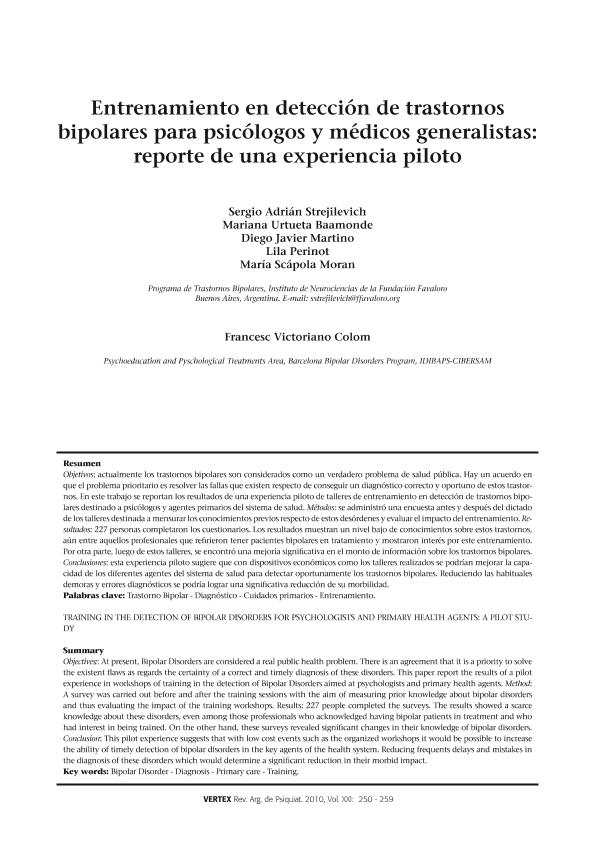Mostrar el registro sencillo del ítem
dc.contributor.author
Strejilevich, Sergio

dc.contributor.author
Urtueta Baamonde, Mariana
dc.contributor.author
Martino, Diego Javier

dc.contributor.author
Perinot, Lila
dc.contributor.author
Scápola Moran, María
dc.contributor.author
Colom, Francesc Victoriano
dc.date.available
2023-02-22T18:04:28Z
dc.date.issued
2010-05
dc.identifier.citation
Strejilevich, Sergio; Urtueta Baamonde, Mariana; Martino, Diego Javier; Perinot, Lila; Scápola Moran, María; et al.; Training in the detection of bipolar disorders for psychologists and primary health agents: A pilot study; Polemos; Vertex; 21; 91; 5-2010; 250-259
dc.identifier.issn
0327-6139
dc.identifier.uri
http://hdl.handle.net/11336/188622
dc.description.abstract
Objetivos: actualmente los trastornos bipolares son considerados como un verdadero problema de salud pública. Hay un acuerdo en que el problema prioritario es resolver las fallas que existen respecto de conseguir un diagnóstico correcto y oportuno de estos trastornos. En este trabajo se reportan los resultados de una experiencia piloto de talleres de entrenamiento en detección de trastornos bipolares destinado a psicólogos y agentes primarios del sistema de salud. Métodos: se administró una encuesta antes y después del dictado de los talleres destinada a mensurar los conocimientos previos respecto de estos desórdenes y evaluar el impacto del entrenamiento. Resultados: 227 personas completaron los cuestionarios. Los resultados muestran un nivel bajo de conocimientos sobre estos trastornos, aún entre aquellos profesionales que refirieron tener pacientes bipolares en tratamiento y mostraron interés por este entrenamiento. Por otra parte, luego de estos talleres, se encontró una mejoría significativa en el monto de información sobre los trastornos bipolares. Conclusiones: esta experiencia piloto sugiere que con dispositivos económicos como los talleres realizados se podrían mejorar la capacidad de los diferentes agentes del sistema de salud para detectar oportunamente los trastornos bipolares. Reduciendo las habituales demoras y errores diagnósticos se podría lograr una significativa reducción de su morbilidad.
dc.description.abstract
Objectives:: At present, Bipolar Disorders are considered a real public health problem. There is an agreement that it is a priority to solve the existent flaws as regards the certainty of a correct and timely diagnosis of these disorders. This paper report the results of a pilot experience in workshops of training in the detection of Bipolar Disorders aimed at psychologists and primary health agents. Method: A survey was carried out before and after the training sessions with the aim of measuring prior knowledge about bipolar disorders and thus evaluating the impact of the training workshops. Results: 227 people completed the surveys. The results showed a scarce knowledge about these disorders, even among those professionals who acknowledged having bipolar patients in treatment and who had interest in being trained. On the other hand, these surveys revealed significant changes in their knowledge of bipolar disorders. Conclusion: This pilot experience suggests that with low cost events such as the organized workshops it would be possible to increase the ability of timely detection of bipolar disorders in the key agents of the health system. Reducing frequents delays and mistakes in the diagnosis of these disorders which would determine a significant reduction in their morbid impact.
dc.format
application/pdf
dc.language.iso
spa
dc.publisher
Polemos
dc.rights
info:eu-repo/semantics/openAccess
dc.rights.uri
https://creativecommons.org/licenses/by-nc-sa/2.5/ar/
dc.subject
BIPOLAR DISORDER
dc.subject
DIAGNOSIS
dc.subject
PRIMARY CARE
dc.subject
TRAINING
dc.subject.classification
Psiquiatría

dc.subject.classification
Medicina Clínica

dc.subject.classification
CIENCIAS MÉDICAS Y DE LA SALUD

dc.title
Training in the detection of bipolar disorders for psychologists and primary health agents: A pilot study
dc.title
Entrenamiento en detección de trastornos bipolares para psicólogos y médicos generalistas: Reporte de una experiencia piloto
dc.type
info:eu-repo/semantics/article
dc.type
info:ar-repo/semantics/artículo
dc.type
info:eu-repo/semantics/publishedVersion
dc.date.updated
2023-02-16T13:26:32Z
dc.journal.volume
21
dc.journal.number
91
dc.journal.pagination
250-259
dc.journal.pais
Argentina

dc.journal.ciudad
Buenos Aires
dc.description.fil
Fil: Strejilevich, Sergio. Universidad Favaloro. Facultad de Medicina. Instituto de Neurociencias; Argentina
dc.description.fil
Fil: Urtueta Baamonde, Mariana. Universidad Favaloro. Facultad de Medicina. Instituto de Neurociencias; Argentina
dc.description.fil
Fil: Martino, Diego Javier. Consejo Nacional de Investigaciones Científicas y Técnicas; Argentina. Universidad Favaloro. Facultad de Medicina. Instituto de Neurociencias; Argentina
dc.description.fil
Fil: Perinot, Lila. Universidad Favaloro. Facultad de Medicina. Instituto de Neurociencias; Argentina
dc.description.fil
Fil: Scápola Moran, María. Universidad Favaloro. Facultad de Medicina. Instituto de Neurociencias; Argentina
dc.description.fil
Fil: Colom, Francesc Victoriano. Barcelona Bipolar Disorders Program; España
dc.journal.title
Vertex
dc.relation.alternativeid
info:eu-repo/semantics/altIdentifier/url/http://www.editorialpolemos.com.ar/vertex91b.php
Archivos asociados
